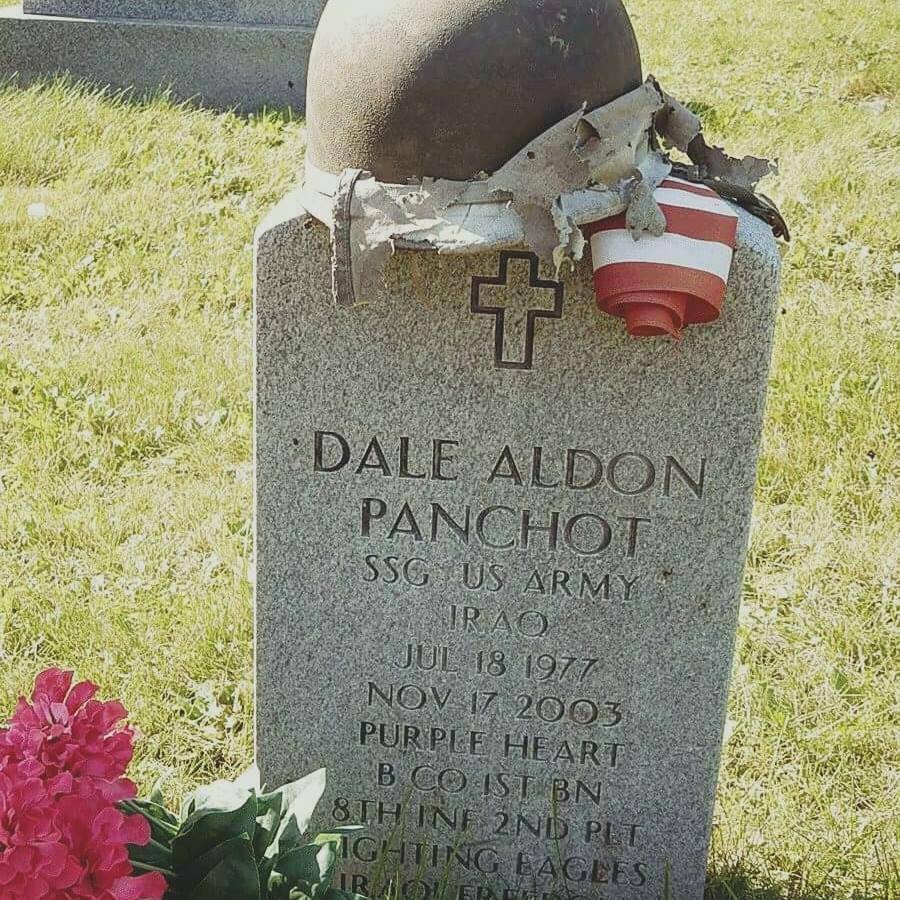

This spring has farmers frustrated to no end. If the spring planting conditions have you down, take this time to focus on a pleasant and worthwhile distraction. Think about those who served and gave all for their country.
I want to use this opportunity, with Memorial Day less than one week away, to share with you a few of my experiences 19 years ago when I was deployed with the 1st Battalion, 8th Infantry Regiment in support of Operation Iraqi Freedom. Our battalion was “The Fighting Eagles” and I was a 26-year-old first lieutenant from Lansford, North Dakota.
We were first alerted that we would deploy in early January 2003. Do you remember that time? United Nations inspection teams were trying to get into Iraq, but Saddam Hussein wasn’t cooperating. President George W. Bush gave Saddam and his sons Uday and Qusay 48 hours to come clean or else. Soon after, the United States Military’s “Shock and Awe” rained down upon Baghdad.
Although we were alerted in January, our battalion didn’t deploy until April. The original plan was for us to arrive in Turkey and then enter Iraq from the north while Marine Forces and the Army’s 3rd Infantry Division came up from the south. Well, Turkey took too long to approve U.S. forces entering their country for such an action. We wound up giving up on them and just going to Kuwait and headed to Baghdad from the south.
We were a mechanized infantry unit equipped with Bradley Fighting Vehicles. Like M1 Tanks but troop carriers and more maneuverable. Our mission was to clear airfields, Iraqi Army bases, and other places suspected of harboring any resistance to our efforts to liberate Iraq from the evil regime of Saddam Hussein.
We eventually settled just outside of the town of Balad, Iraq – about an hour north of Baghdad. We operated in that area during the day by training Iraqi police and civil defense forces from scratch. At night, we acted on intelligence gathered from locals that we could trust to find insurgents who had attacked us and other U.S. forces.
I want to tell you about three members of my battalion who I think about every Memorial Day.
The first being Staff Sergeant Dale Panchot, from Northome Minnesota.
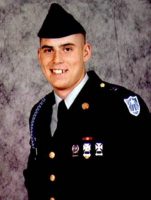
During the last hours of November 16th, 2003, I was on patrol with 1st platoon, Alpha Company. I was the company executive officer, and me and the company commander spent time with each platoon on regular security patrols. It was my turn to go, and we were headed to patrol the area around a neighboring town, Albu Hishma.
Albu Hishma was not a friendly place. Our units met resistance there in the form of small attacks. The last few weeks had been particularly troublesome in that area so Alpha, Bravo, and Charlie Company were spending extra time patrolling the area. My patrol with 1st Platoon ended after a very boring several hours. We headed back to where our company headquarters was set up – in an abandoned Saddam Fayadeen training complex barracks. We were relieved by a platoon from Bravo Company. We went back to get some sleep.
The memory of waking up on the morning of November 17th, 2003 is burned in my memory more vivid than my waking up this morning. Sergeant First Class Perkins burst into my room. “SIR! Eagle 6 wants all commanders and XOs up on the net. Bravo Company has enemy contact and one friendly KIA.” An entire battalion sprang into action. Our methods in Iraq had been successful so far. But on November 17th, 2003 – we lost one of our own. Staff Sergeant Dale Panchot was fatally wounded when an armor piercing rocket propelled grenade entered the side of the Bradley Fighting Vehicle he was in. It was the same area I was at earlier with 1st Platoon. This just got real.
Sergeant Panchot was about two months older than me. I didn’t know him well, because he was in Bravo Company and I was in Alpha. But he seemed like someone we would know from our small-town way of life here. He was from a small town in Minnesota. He liked to hunt and fish. He was Lutheran. His brother lived in Jamestown.
Captain Eric Paliwoda from Farmington, Connecticut is another soldier I think about on Memorial Day.
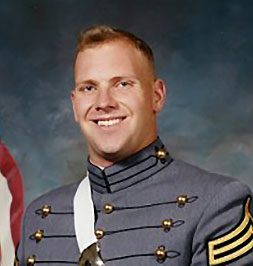
Late in the fall of 2003, we started to experience enemy insurgents shooting mortars at us. The first time I experienced a mortar attack, I was horrified. I can’t do it justice to explain it. I thought a 1000-gallon gasoline truck had exploded right outside my window. The blast was deafening. I later found out that the mortar round itself landed about 150 yards away. How could something be so far away and yet be so loud and so destructive?
On January 2nd, 2004, we experienced another mortar attack. We were so used to them at this point that we would execute the battle drill we called “Eagle Spider Web.” Whether we were out on patrol or at our command post, we would immediately go to pre-assigned points throughout the city and outskirts of Balad and see if we could find the fleeing culprits. Often, once we finally got the feedback from radar tracking the location where the shot was fired, it was too late. The insurgents who shot the mortars were long gone. It was very frustrating. However, that day, on January 2nd, when we got back to base, we found out the most frustrating news of all. A mortar round had pierced the side of the wall of a living container – a FEMA trailer like structure – where some of the 4th Engineer Battalion soldiers had been staying right next to battalion headquarters. A mortar round tore through the side of that metal wall like it was a wet piece of paper and shrapnel killed Captain Eric Paliwoda.
Captain Paliwoda was a West Point Grad. He stood 6 foot 7 inches tall and was a large man. During battalion operations briefings, when he spoke, everyone paid close attention, because he had a deep booming voice. The kind of voice you’d imagine that God would have.
Last, and most certainly not least is Colonel Darron Wright from Mesquite, Texas.
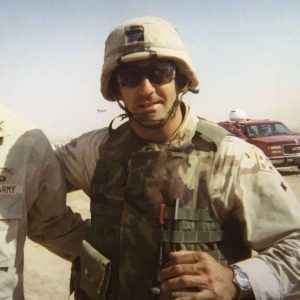
He was Major Wright when I served with him in the Fighting Eagle Battalion. I’ve never met someone more full of life than Major Wright. He was the battalion operations officer. The battalion commander often affectionately referred to him as a neanderthal or a knuckle dragger. He liked lifting weights, chewing tobacco, and the Texas Longhorns. He would often randomly sound off with the motto and hand signal “Hook ‘em Horns!”
When we drove through towns in Iraq, we could tell Major Wright had been there before or wasn’t too far in front of us when the little kids would wave at us in the streets waiving the Hook ‘em Horns hand signal. He’d been there and taken the time to teach these little Iraqi kids about Texas football. “Red Bull, Red Vines and Red Man” was also his motto. Unlike the other gentlemen I’ve described today, Major Wright made it through Iraq.
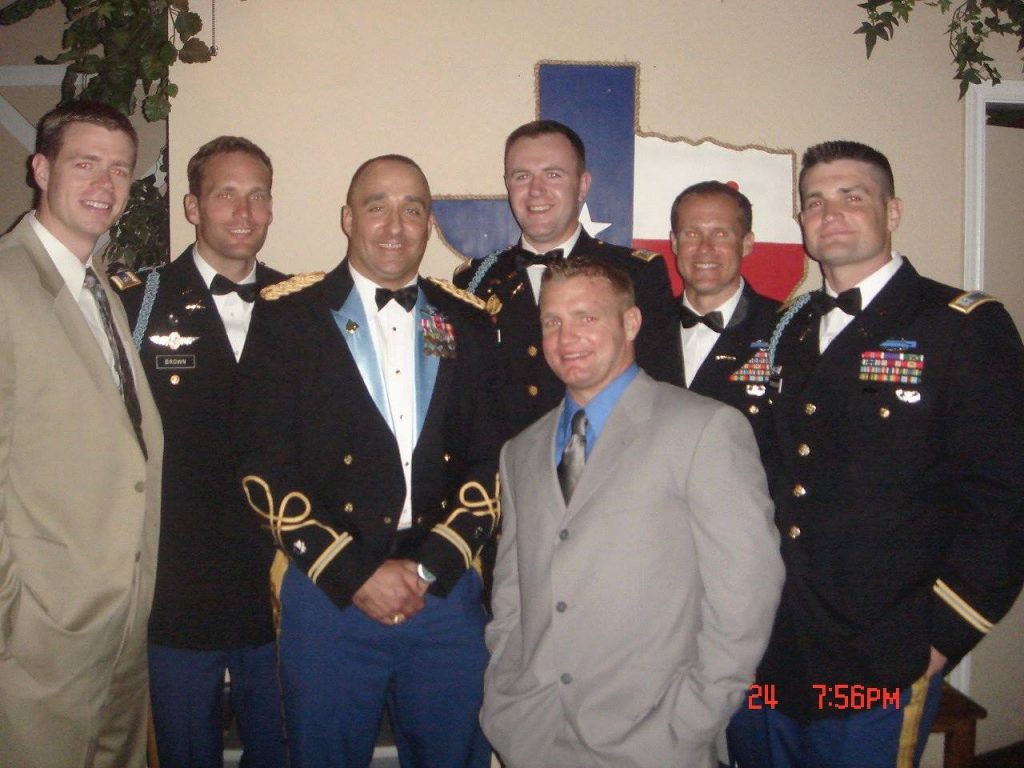
After we got home, a few of us officers would go to the casino in Cripple Creek, CO, and Major Wright basically taught us how to play Texas Hold Em Poker on the tables there. “You gotta bet big to win big Airborne!” He’d say. He was a character. And everybody loved him. He was promoted to Lieutenant Colonel and then later to Colonel. He died on Monday, September 23rd, 2013 when his parachute malfunctioned during a training mission at Fort Bragg, North Carolina. He was 45 years old.
The Fighting Eagle Battalion Commander was Lieutenant Colonel Nate Sassaman. He is the best leader I ever served with, and he still keeps in touch with his soldiers and officers. Not being able to bring Sergeant Panchot and Captain Paliwoda home from Iraq weighs most heavily on Colonel Sassaman. In 2008 he wrote a book about our battalion. It’s called “Warrior King: The Triumph and Betrayal of an American Commander in Iraq.” I want to share with you an excerpt:
“Soldiers are expected to be robots. We’re expected to not feel anything. Everybody looks at the military and thinks we’re all the same; but we’re not. We’re individuals in those desert camouflage uniforms, and we all have different feelings. I can assure you that every single person who has been outside the wire, in the fight, is wounded deeply inside his heart; a combat veteran will always be whatever his age was at the time he served in conflict. If he was nineteen hitting the beach at Normandy…if he was twenty-three fighting on Christmas Hill in Korea…if he was a thirty-three-year-old company commander in the Ia Drang Valley in Vietnam…or if he was a forty-year-old battalion commander in Iraq’s Salah Ah Din Province. He will always be that brokenhearted soldier, locked at that stage, for the rest of his life. For in answering their country’s call, right or wrong, these soldiers not only earned their citizenship, but gave everything they had to offer – heart, soul, mind, and body. They fought for themselves and their buddies, and even for the citizens of a foreign land, and along the way they saw things they shouldn’t have seen, and did things people should not have to do. There is so much of combat that is contrary to all that we are taught as human beings and so much of war that is horrible and tragic. I believe it is necessary sometimes, but that doesn’t diminish the fallout. War is a terrible thing, the depth of its ugliness is understood only by those who have been through it. And in every war, there are casualties.”
It is truly an honor to share my stories with you. With the wars of Iraq and Afghanistan still being fresh in our minds, and the fact that we have many Vietnam veterans still with us, you probably know of someone who gave all for their country. Use every Memorial Day weekend to reflect and tell stories about those great Americans to honor their legacy. And enjoy the freedoms of Memorial Day weekend: outdoor recreation with friends and family, grilling, the celebration of school being out and summer being upon us. Please keep Sergeant Panchot, Captain Paliwoda, Colonel Wright, and all of our honored dead in your thoughts and prayers.
Honor Memorial Day. Fighting Eagles. Hook Em Horns.